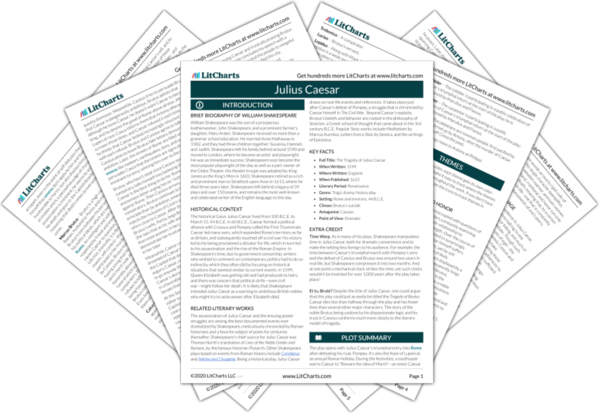Marcus Brutus Quotes in Julius Caesar
Men at some time are masters of their fates:
The fault, dear Brutus, is not in our stars,
But in ourselves, that we are underlings.
I grant I am a woman; but withal a woman that Lord Brutus took to wife; I grant I am a woman; but withal a women well reputed, Cato's daughter. Think you I am no stronger than my sex, being so father'd, and so husbanded? Tell me your counsels, I will not disclose'em. I have made a strong proof of my constancy, giving myself a voluntary wound here, in the thigh: can I bear that with patience, and not my husband's secrets?
Et tu, Bruté? — Then fall, Caesar!
Friends, Romans, countrymen, lend me your ears;
I come to bury Caesar, not to praise him.
The evil that men do lives after them;
The good is oft interred with their bones;
So let it be with Caesar. The noble Brutus
Hath told you Caesar was ambitious:
If it were so, it was a grievous fault;
And grievously hath Caesar answer'd it.
Here, under leave of Brutus and the rest, —
For Brutus is an honorable man;
So are they all, all honorable men, —
Come I to speak in Caesar's funeral.
He was my friend, faithful and just to me:
But Brutus says he was ambitious;
And Brutus is an honorable man.
Remember March, the ides of March remember:
Did not great Julius bleed for justice' sake?
What villain touch'd his body, that did stab,
And not for justice? What, shall one of us
That struck the foremost man of all this world
But for supporting robbers, shall we now
Contaminate our fingers with base bribes,
And sell the mighty space of our large honours
For so much trash as may be grasped thus?
I had rather be a dog, and bay the moon,
Than such a Roman.
There is a tide in the affairs of men
Which, taken at the flood, leads on to fortune;
Omitted, all the voyage of their life
Is bound in shallows and in miseries.
On such a full sea are we now afloat;
And we must take the current when it serves,
Or lose our ventures.
But this same day
Must end that work the ides of March begun;
And whether we shall meet again I know not.
Therefore our everlasting farewell take:
For ever, and for ever, farewell, Cassius!
If we do meet again, why, we shall smile;
If not, why, then, this parting was well made.
This was the noblest Roman of all
All the conspirators, save only he,
Did that they did in envy of great Caesar;
He only, in a general honest thought,
And common good to all, made one of them.
His life was gentle; and the elements
So mix'd in him that Nature might stand up
And say to all the world, "This was a man."

Marcus Brutus Quotes in Julius Caesar
Men at some time are masters of their fates:
The fault, dear Brutus, is not in our stars,
But in ourselves, that we are underlings.
I grant I am a woman; but withal a woman that Lord Brutus took to wife; I grant I am a woman; but withal a women well reputed, Cato's daughter. Think you I am no stronger than my sex, being so father'd, and so husbanded? Tell me your counsels, I will not disclose'em. I have made a strong proof of my constancy, giving myself a voluntary wound here, in the thigh: can I bear that with patience, and not my husband's secrets?
Et tu, Bruté? — Then fall, Caesar!
Friends, Romans, countrymen, lend me your ears;
I come to bury Caesar, not to praise him.
The evil that men do lives after them;
The good is oft interred with their bones;
So let it be with Caesar. The noble Brutus
Hath told you Caesar was ambitious:
If it were so, it was a grievous fault;
And grievously hath Caesar answer'd it.
Here, under leave of Brutus and the rest, —
For Brutus is an honorable man;
So are they all, all honorable men, —
Come I to speak in Caesar's funeral.
He was my friend, faithful and just to me:
But Brutus says he was ambitious;
And Brutus is an honorable man.
Remember March, the ides of March remember:
Did not great Julius bleed for justice' sake?
What villain touch'd his body, that did stab,
And not for justice? What, shall one of us
That struck the foremost man of all this world
But for supporting robbers, shall we now
Contaminate our fingers with base bribes,
And sell the mighty space of our large honours
For so much trash as may be grasped thus?
I had rather be a dog, and bay the moon,
Than such a Roman.
There is a tide in the affairs of men
Which, taken at the flood, leads on to fortune;
Omitted, all the voyage of their life
Is bound in shallows and in miseries.
On such a full sea are we now afloat;
And we must take the current when it serves,
Or lose our ventures.
But this same day
Must end that work the ides of March begun;
And whether we shall meet again I know not.
Therefore our everlasting farewell take:
For ever, and for ever, farewell, Cassius!
If we do meet again, why, we shall smile;
If not, why, then, this parting was well made.
This was the noblest Roman of all
All the conspirators, save only he,
Did that they did in envy of great Caesar;
He only, in a general honest thought,
And common good to all, made one of them.
His life was gentle; and the elements
So mix'd in him that Nature might stand up
And say to all the world, "This was a man."
















